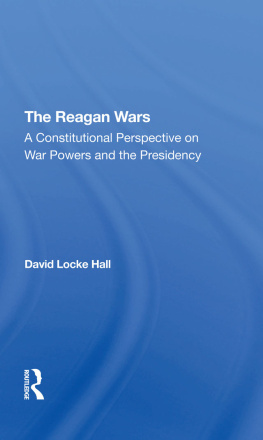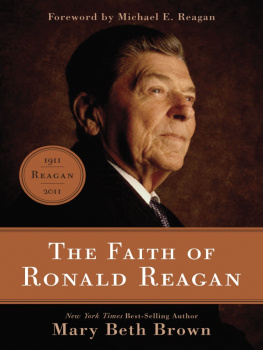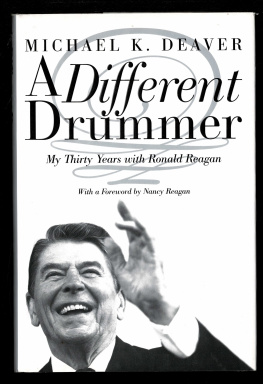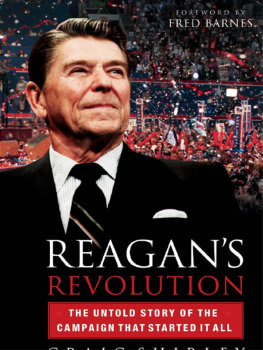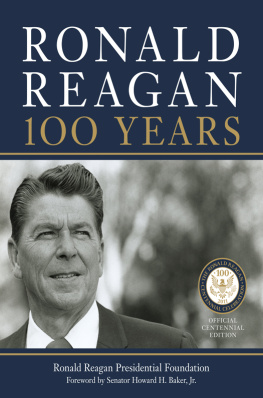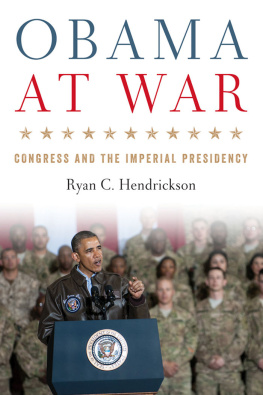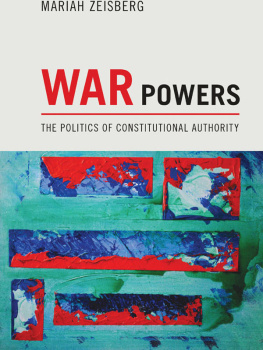The Reagan Wars
The Reagan Wars
A Constitutional Perspective on War Powers and the Presidency
David Locke Hall
First published 1991 by Westview Press, Inc.
Published 2019 by Routeldge
52 Vanderbilt Avenue, New York, NY 10017
2 Park Square, Milton Park, Abingdon, Oxon OX14 4RN
Routledge is an imprint of the Taylor & Francis Group, an informa business
Copyright 1991 Taylor & Francis
All rights reserved. No part of this book may be reprinted or reproduced or utilised in any form or by any electronic, mechanical, or other means, now known or hereafter invented, including photocopying and recording, or in any information storage or retrieval system, without permission in writing from the publishers.
Notice:
Product or corporate names may be trademarks or registered trademarks, and are used only for identification and explanation without intent to infringe.
Library of Congress Cataloging-in-Publication Data
Hall, David Locke.
The Reagan wars: a constitutional perspective on war powers and the presidency / David Locke Hall.
p. cm.
Includes bibliographical references and index.
ISBN 0-8133-1198-5
1. War and emergency powersUnited States. 2. Executive power United States. 3. United StatesConstitutional law. 4. United StatesForeign relations1981-1989. 5. Reagan, Ronald. I. Title.
KF5060.H35 1991
342.73'0412dc20
[347.302412]
91-13127
CIP
ISBN 13:978-0-367-29543-1 (hbk)
Contents
- PART ONE
A Clash of Wills: The Constitutional Balance of War Powers - PART TWO
The Reagan Wars, 1980-1988
President Reagan's term in office was characterized by what has been called a "compellent diplomacy." Punctuating the cycles of this violent peace during the Reagan years were four significant episodes of military force ordered by the President. This book explores the question of whether Reagan's use of the military in these four situations was constitutional. Those who believe that the issue of the constitutionality of the President's use of force is a purely academic exercise will have no interest in this book, which is written for those who believe in the rule of law.
David Locke Hall
Notes
Huntington, "Coping with the Lippmann Gap," 66 FOREIGN AFFAIRS 453,463 (1988). See also B. BLECHMAN AND S. KAPLAN, FORCE WITHOUT WAR (1978).
Watkins, "The Maritime Strategy," U.S. Naval Institute PROCEEDINGS (January 1986 Supplement).
Wellington thrashed Bonaparte,
as ev'ry child can tell,
The House of Peers,
throughout the war,
Did nothing in particular,
And did it very well:
Yet Britain set the world a-blaze
In good King George's glorious days!
Gilbert and Sullivan, "When Britain Ruled the Waves," lolanthe (or the Peer and the Peri)
The King (in disguise): Methinks I could not die anywhere so contented as in the King's company, his cause being just....
Williams (a soldier): But if the cause be not good, the King himself hath a heavy reckoning to make when all those legs and arms and heads, chopped off in a battle, shall join together at the latter day and cry all, 'We died at such a place,' some swearing, some crying for a surgeon, some upon their wives left poor behind them....
W. Shakespeare, KING HENRY V
On more than a hundred occasions since the Constitutional Convention of 1787, Presidents have waged war without a congressional declaration. For these critics, the argument that the Vietnam War was unconstitutional is based solely on the absence of a declaration of war.
Since the Vietnam War, the debate has been revisited on each occasion of presidential war-making. Unfortunately, these debates, though intensive, have been too short-lived to produce any resolution. Interest in debating the fine points of the war powers wanes after the conclusion of a military operation. Other issues arise and demand attention, leaving the war powers question in limbo, awaiting resurrection on the next occasion of presidential war-making.
Opponents of war-making by President Reagan have argued that, since Congress alone is empowered to declare war, the President exceeds the scope of his constitutional authority by employing force abroad without a declaration of war. At stake in these debates, however, is not only the question of whether a particular belligerent act by the President is constitutionally authorized, but also the broader issue of how seriously the Constitution is to be treated in determining the distribution of the war powers.
One of the sources of confusion and incoherency in the post-Vietnam war powers debates has been the failure of many participants to distinguish the question of whether the President's actions were lawful from the question of whether they were wise. This book is about the former; it seeks to determine whether the circumstances under which the Constitution permits unilateral presidential war-making were present when President Reagan waged war between 1980 and 1988. It will show that, given the breadth of the President's war powers under the Constitution, each of President Reagan's military involvements was lawful. Thus the constitutional balance of war powers will be seen to favor the President in the short term and Congress in the long run. This balance of constitutional powers will lead to political equilibrium only by means of a clash of wills between the President and Congress.
The first section of the book will describe the constitutional balance of war powers. The views of the Framers and the courts on the issue of presidential war-making will be presented along with an explanation for the reluctance of the courts to address the issue. The War Powers Resolution will be criticized as an unsuccessful attempt to adjust the balance of war powers in favor of Congress.
The second section of this book will describe instances of presidential war-making from 1980 to 1988. The following episodes will be covered: the 1982-1984 deployment of U.S. Marines to Lebanon; the 1983 intervention in Grenada; the 1986 air strikes against Libya from the Gulf of Sidra; and the Persian Gulf operations in 1987 and 1988. Although such policies and events raised numerous interesting legal issues, they did not involve a unilateral presidential decision to commit US. forces to combat.
This book seeks to show that all four instances of war-making by President Reagan were undertaken within the scope of the President's broad, but not unlimited, war powers. The conclusion that President Reagan's use of force was lawful does not imply the wisdom of such military operations. Thus this book seeks to be something other than an apologia or a legal brief for President Reagan. The legal analysis presented here does not apply exclusively to President Reagan or Republican presidents. The legal rules apply with equal force to President Carter's hostage rescue mission in Iran, President Kennedy's use of the military in Vietnam, President Truman's use of force in Korea, and President Roosevelt's use of the military in World War II prior to the U.S. declaration of war. The ultimate conclusion of this book is that, regardless of how the war powers are allocated, they are allocated by the Constitution and not by political expediency. The war powers equilibrium between the President and Congress is not determined by transient political popularity but by deliberate reference to the meaning of the Constitution.

